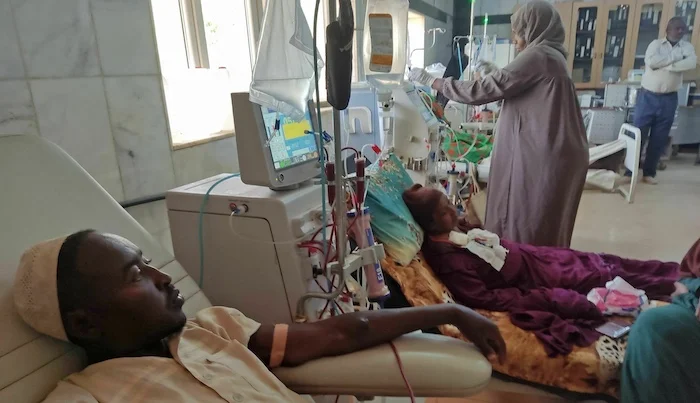A catastrophic attack on Al Mujlad Hospital in Sudan’s West Kordofan state on Saturday, June 21, 2025, killed over 40 people, including six children and five health workers.
This marks one of the deadliest assaults on healthcare since Sudan’s civil war erupted in April 2023.
The World Health Organization (WHO) chief, Dr. Tedros Adhanom Ghebreyesus, condemned the strike as “appalling,” urging an immediate end to attacks on medical facilities.
The hospital, the only functioning healthcare provider in the region, was struck near the frontlines of intense clashes between the Sudanese Armed Forces (SAF) and the paramilitary Rapid Support Forces (RSF).
The attack left the facility in ruins, destroying its dialysis unit and critical services for civilians. “Hospitals are not a target,” Dr. Tedros declared, highlighting the violation of international law protecting health facilities.
The United Nations has labeled Sudan’s conflict the world’s worst humanitarian crisis, with over 12 million displaced and 20 million facing acute hunger.
Disputed Responsibility
The attack’s perpetrators remain contested.
The RSF and civil society groups, including the Sudan Doctors Network, accused the SAF of targeting RSF fighters allegedly stationed inside the hospital, though the army has not responded to these claims.
Human rights group Emergency Lawyers reported a lower death toll, alleging an SAF drone strike, but evidence remains inconclusive.
Both sides have faced accusations of war crimes, with frequent attacks on civilians and medical staff exacerbating Sudan’s collapse.
The loss of Al Mujlad Hospital is a devastating blow to a region already grappling with malnutrition, disease, and displacement.
Sudan’s healthcare system, battered by three years of war, struggles to serve millions, with children particularly vulnerable.
UNICEF warns of rising malnutrition, school closures, and exploitation risks, with 4 million Sudanese fleeing to neighboring countries like Chad and South Sudan.
A Worsening Crisis
The attack underscores the relentless targeting of health facilities, despite their protected status under international humanitarian law.
WHO and UNICEF have repeatedly called for accountability, but violations persist, leaving civilians without care.
Sudan’s war, now in its third year, shows no signs of abating, with tens of thousands killed and infrastructure decimated.
This tragedy contrasts with regional efforts to bolster stability, such as Nigeria’s $1 billion agriculture and energy deal with Brazil, signed on June 24, which aims to enhance food security.
Sudan’s crisis highlights the urgent need for similar investments in peace and humanitarian aid to rebuild its shattered systems.
A Global Call to Action
As Sudan reels from this latest atrocity, global health leaders demand an end to attacks on healthcare.
Can international pressure halt the violence, or will Sudan’s humanitarian catastrophe deepen? The world must act to protect civilians and restore hope.




















